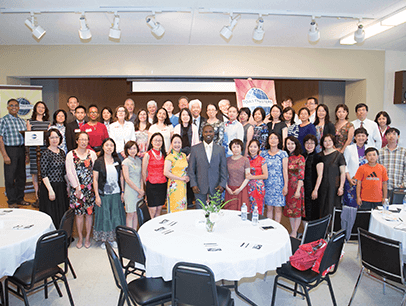
Wouldn’t it be amazing if you could attend the 2020 Toastmasters International Convention in Paris and order a drink at a café on the Champs Elysées in fluent French? And how marvelous it would be to speak with a clerk at a French boutique. Now is the time to start if you wish to parler français before August!
We are often our own worst enemy when it comes to speaking a foreign language. We can reel off a dozen excuses (I’m too old; It’s too hard; I already tried and it didn’t work; I find it difficult to remember things …), and yet, what do you say to guests at your Toastmasters club when they say the very same thing about their doubts in their ability to speak in public? Hopefully, you reassure them and tell them that their beliefs can be changed. It’s the same for those limiting beliefs concerning speaking a foreign language.
When someone tells me they are trying to learn a new language, I suggest changing the word from learning to acquiring. When you’re learning something, you place yourself firmly in the shoes of an apprentice. When you’re acquiring, you are already on the road to fluency. As a Toastmaster, you need no reminder of the power of the words we say to ourselves, and this is one of them.
I’ve rounded up three tips I feel are essential for language acquisition. And all of them have much in common with preparing a speech!
1 Define your objective.
If you don’t link an important goal with a date of completion, and with a means of measuring your success, you will find that you focus on things you typically procrastinate on or that easily frustrate you. Example of a tangible objective: By August 1, 2020, I will be able to make a telephone call in French to tell my hotel what time I will be arriving.
Acquiring another language takes time—but it may take less time than you think.
There should always be a test of your success in each objective. And luckily, that test has absolutely nothing to do with conjugating verbs!
2 Find small chunks of time to practice.
Acquiring another language takes time—but it may take less time than you think. If you have already studied a certain language at school, you will be surprised how much has stuck, even if your skill lies somewhat dormant.Start planning ways to incorporate language skills into your daily routine. If you normally have breakfast alone, use the time to do some reading or listening. If you travel to work, get out your earphones or book and put your travel time to good use.
If you have two or three years of schooling in a language, you will want to devote around 20 minutes a day, five days a week, in order to reach your objective. For how long? Well, that depends on how ambitious your objective is. But for most people, six months should be enough to be comfortable in everyday conversations.
3 Emulate body language.
Invent a version of yourself as someone in that culture. There are often distinct patterns to how people speak in different parts of the world; watch some clips online and try to copy the stance, the gestures, and the body language. Even wearing a piece of clothing from the area helps.
Read, but Don’t Study
Research has proven that the most important activity, the one that will give you the greatest boost in becoming proficient in another language, is reading. Even if you want to learn to speak, reading for 10 minutes a day will help you progress more quickly. The secret is to only read things you find enjoyable … magazine articles, short stories, social media posts, cartoons, anything that is short and just a little higher than your current level of competence.
I don’t recommend that you bother with grammar, however. There are far better ways to learn a language, and regular reading is one of them. Go online and type “easy readers to learn French” in your search engine. Folk tales and fairy stories are helpful; knowing the plot in your own language will make it easier for you to understand. You can search for articles on fashion or read newspapers about current events or whatever interests you. Just be sure that you enjoy whatever you read—don’t take time to analyze the grammar.
Get Creative and Have Fun
There are plenty of opportunities to painlessly sneak some foreign language into your day:
- Set your cellphone, GPS, or even video games to the foreign language. Start tuning your ear to regularly hear the words and cadence of the language.
- Listen and watch people speaking the language. YouTube is one of the best language teachers in the world. Watch how native speakers use facial expressions and move their mouths. Try listening with subtitles and then without. Siegfried Haack, the 2020 Toastmasters International Convention Host District Chair, has a series of French videos titled “31 Stories in 31 Days.”
- Listen to songs. Look up the words, learn the song, and sing away! You will get a great exercise in pronunciation and vocabulary as well as learn a new song.
- Find more structured programs if that’s what you prefer. Frantastique is a subscription email program that sends you a daily, customized lesson with immediate personalized corrections and explanations. And they're offering readers a free month! There is also the excellent program LingQ, designed by the polyglot Steve Kaufman.
- Organize a language exchange session with a fellow Toastmaster who speaks the language. Set up an online or live session, then switch languages every 10 minutes so both of you can practice speaking and listening.
- Watch a French or Canadian television series. As you become familiar with the characters, their way of speaking, and their stock phrases, you will progress in your understanding. For a generation of French students, their best English teacher was the 1990s TV show "Friends"! The website FluentU has short, fun videos and even TV shows. It does require a fee to subscribe.
- Finally, don't feel the need to apologize for your accent. Everyone has an accent when they speak a foreign language, and that is an integral part of who you are. Remember that when you are trying to communicate with someone, most likely they are not making a list of errors you make. They are concentrating on the pleasure of your interaction.
Remember, learning to speak a foreign language has so much in common with learning to speak in public: You need regular practice, a dose of self-confidence, and a strong desire to please your audience.
Don’t feel the need to apologize for your accent. Everyone has an accent when they speak a foreign language, and that is an integral part of who you are.
Have fun acquiring some French phrases and conversational tidbits. It’s infinitely more rewarding to go to a foreign country when you are comfortable with speaking and reading the language! Good luck, or as the French would say, bonne chance!
Carol Bausor is the founder of ILTC, a language training company in France. She teaches and runs workshops and events on feeling confident when speaking a foreign language. Learn more at lespeakshow.com.



 Previous
Previous
 French and English Similarities
French and English Similarities
 Previous Article
Previous Article

